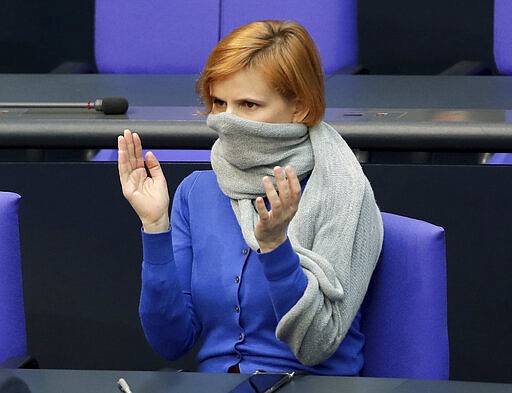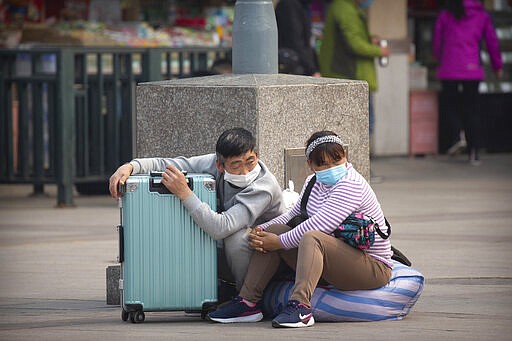What you need to know today about the virus outbreak
The White House and Senate leaders of both parties have agreed on unprecedented emergency legislation to rush sweeping aid totaling some $2 trillion to businesses, workers and a health care system slammed by the coronavirus pandemic.
Meanwhile, India's 1.3 billion people joined the global lockdown, and Prince Charles has tested positive for the new coronavirus.
Here are some of AP's top stories Wednesday on the world's coronavirus pandemic. Follow APNews.com/VirusOutbreak for updates through the day and APNews.com/UnderstandingtheOutbreak for stories explaining some of its complexities.
WHAT'S HAPPENING TODAY:
— A “cacophony of coughing” in packed emergency rooms. Beds squeezed in wherever there is space. Overworked, sleep-deprived doctors and nurses rationed to one face mask a day and wracked by worry about a dwindling number of available ventilators as New York City’s hospitals become the war-zone-like epicenter of the nation’s coronavirus crisis.
— Despite what you may have read in a text message or on social media, there are currently no plans for a national quarantine, let alone martial law. Rumors of a military-enforced national lockdown have been debunked repeatedly by state and federal authorities who say their recurrence shows why it’s vital to find reliable sources of information.
— The coronavirus is waging a war of attrition against health care workers throughout the world, but nowhere is it winning more battles at the moment than in Italy and in Spain, where protective equipment and tests have been in severely short supply for weeks.
— The pandemic is also touching remote areas spread across rural America, with the people living in those communities where “working from home” can mean driving a tractor alone through a empty field. Tiny towns tucked into Oregon’s windswept plains and cattle ranches miles from anywhere in South Dakota might not have had a single case of the coronavirus, but their main streets are also empty and their medical clinics overwhelmed by the worried.
— Restaurants, hotels, airlines, automakers and entertainment venues have been hit hard around the world as cities, states and entire countries have ordered the closure of non-essential businesses and directed residents to remain at home. U.S. Department of Labor figures to be released Thursday are expected to shatter the old record for the greatest number of new unemployment claims filed in a single week. There are more suddenly jobless Americans than during the Great Recession. And more than in the aftermath of major natural disasters such as hurricanes, fires and floods.
WHAT YOU NEED TO KNOW:
For most people, the coronavirus causes mild or moderate symptoms, such as fever and cough that clear up in two to three weeks. For some, especially older adults and people with existing health problems, it can cause more severe illness, including pneumonia and death. The vast majority of people recover.
Here are the symptoms of the virus compared with the common flu.
One of the best ways to prevent spread of the virus is washing your hands with soap and water. The U.S. Centers for Disease Control and Prevention recommends first washing with warm or cold water and then lathering soap for 20 seconds to get it on the backs of hands, between fingers and under fingernails before rinsing off.
You should wash your phone, too. Here’s how.
Misinformation overload: How to separate fact from fiction and rumor from deliberate efforts to mislead.
___
ONE NUMBER:
$300,000: The money donated by the Michael Jackson estate to help people in the entertainment industry hurt by the coronavirus pandemic. The donations will focus on Broadway workers, as well as workers in Las Vegas and in the music industry. Jackson's estate announced Wednesday that it will give $100,000 apiece to Broadway Cares, Three Square food bank in Nevada and the Recording Academy's MusiCares. The estate's co-executor John Branca tells The Associated Press the gifts are personal for the keepers of Jackson's affairs and legacy and are in line with the singer's charitable endeavors during his lifetime.
___
IN OTHER NEWS:
PLAYING THROUGH: Many golf courses around the country have remained open during the coronavirus pandemic. The hope is that golf can provide an outlet for the stir crazy and a dose of normalcy. The question is whether recreational golf safe enough under the circumstances. Courses have barred touching the flagsticks and turned the hole cups upside down so golfers don't need reach in to retrieve the ball.
___
Follow AP coverage of the virus outbreak at https://apnews.com/VirusOutbreak and https://apnews.com/UnderstandingtheOutbreak
















